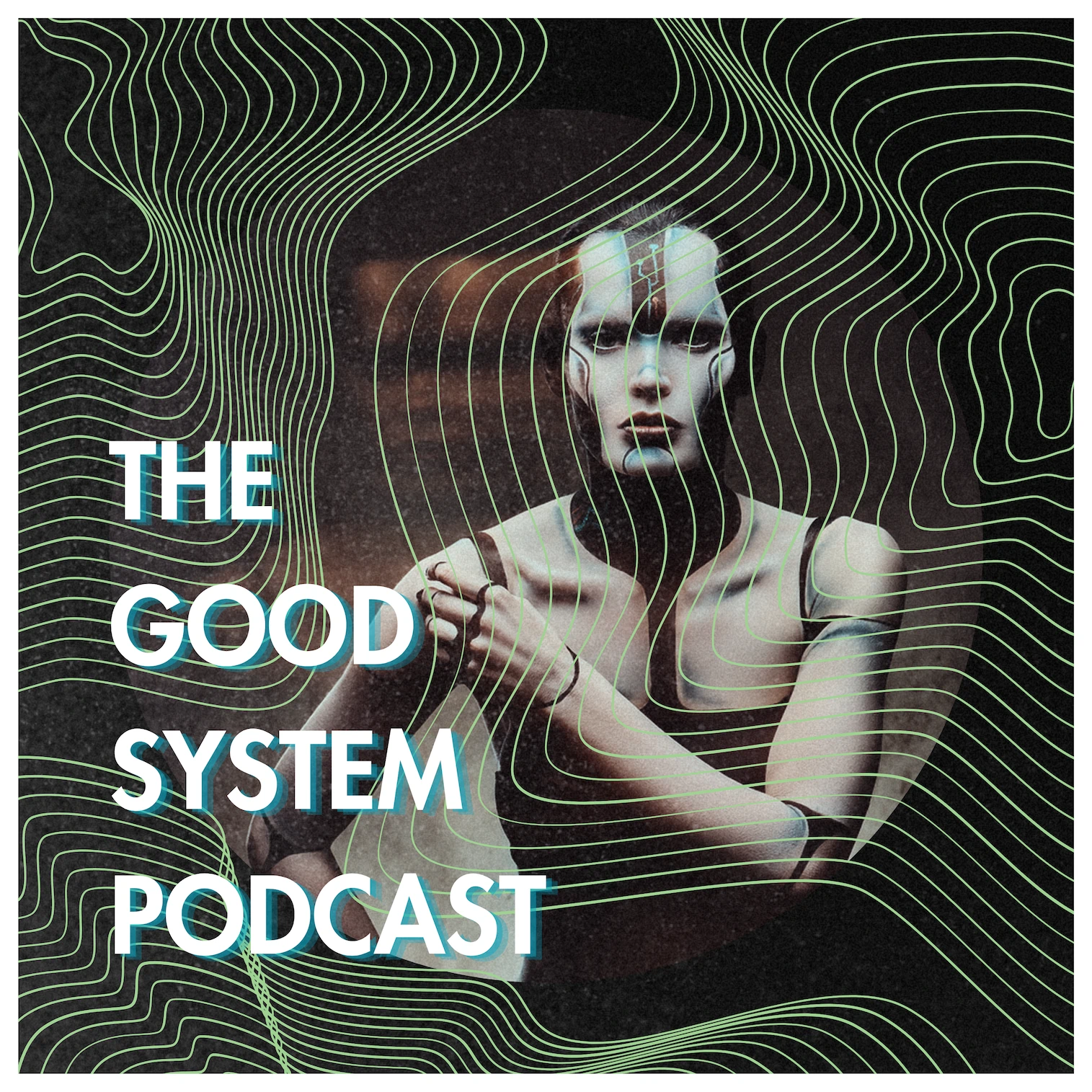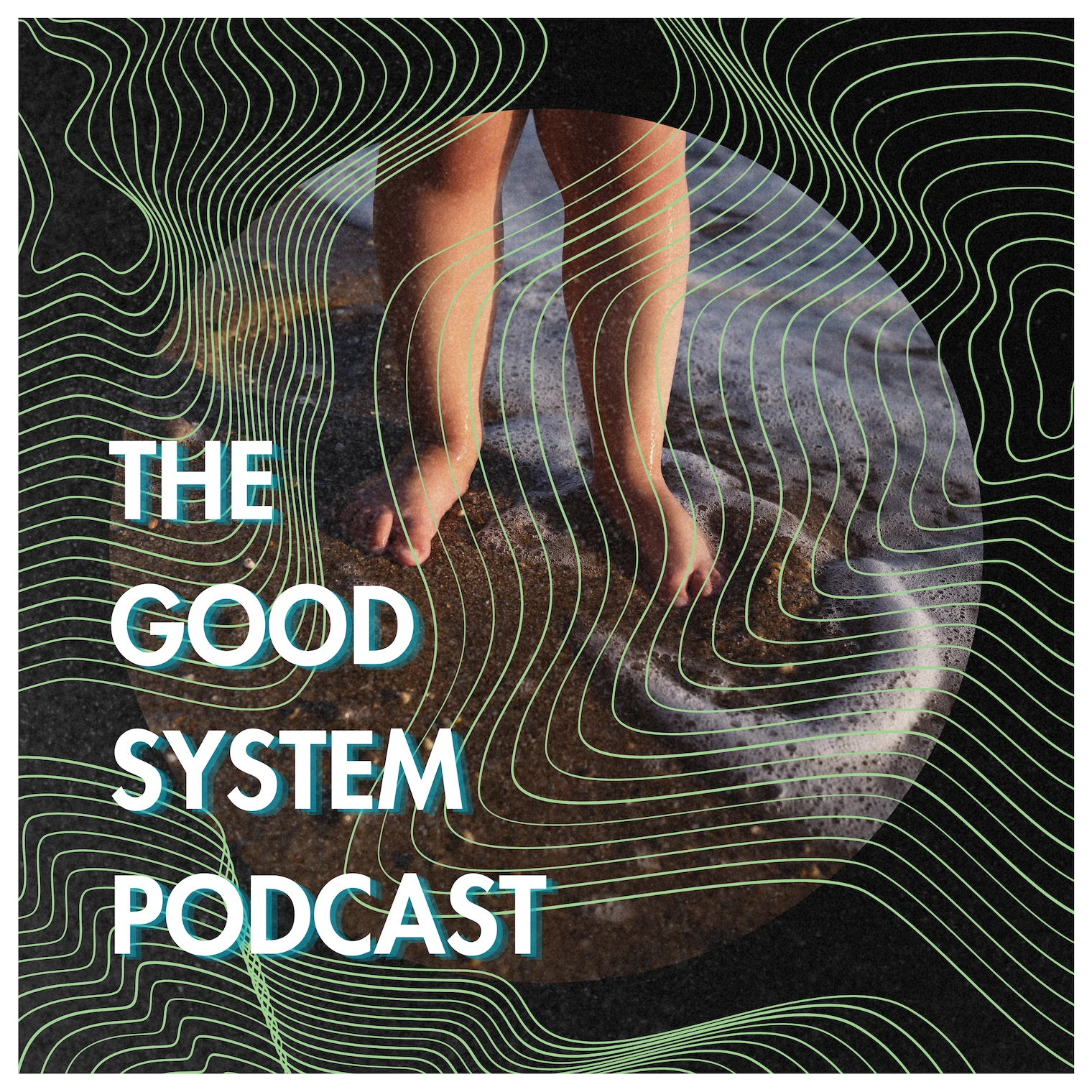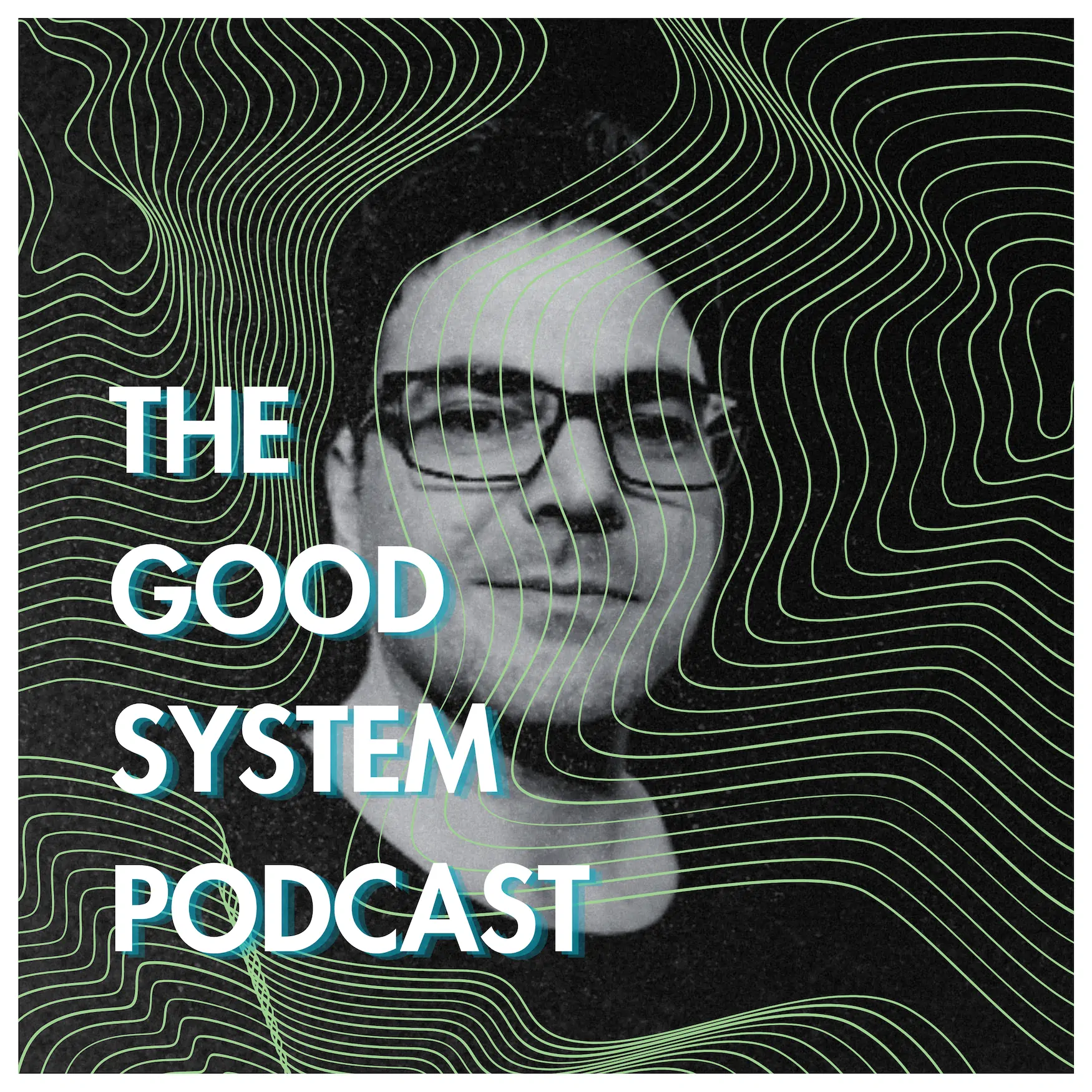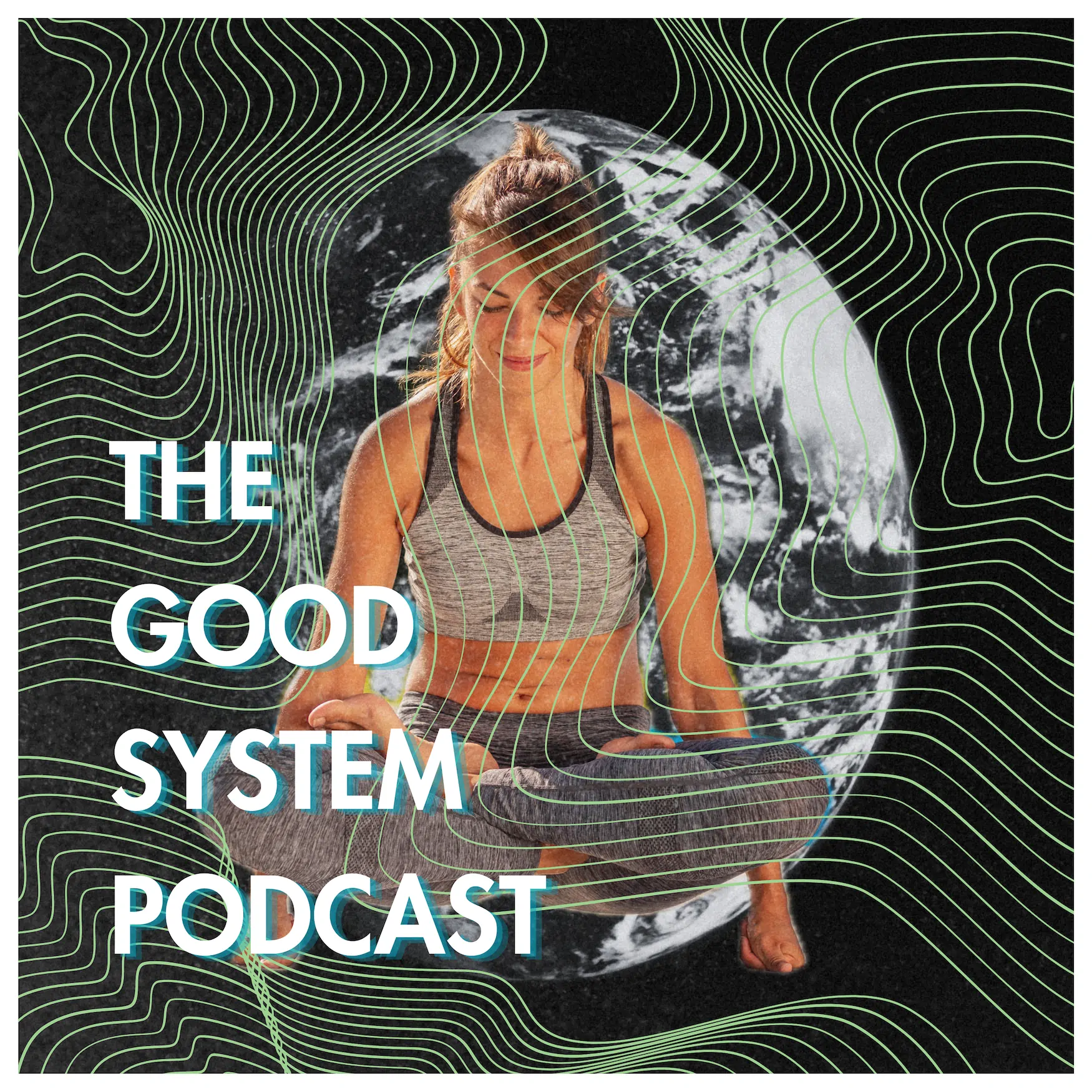Episode Transcript
[00:00:00] Picture. It's 2035. You wake up at noon, not because you're lazy, but because you literally have nothing else to do. Your AI assistant has already organized your life.
[00:00:15] Your robot has cleaned your house and your job, well, that doesn't exist anymore.
[00:00:24] You check your bank account and, yeah, it's empty, because while the machines took over your job, nobody bothered to figure out how you're supposed to, you know, survive.
[00:00:36] So congratulations, you're living in the AI revolution.
[00:00:42] And spoiler alert, we are building this future right now, whether we want to or not.
[00:00:49] Hello and welcome, Ian. I'm Ian the Bay. And this is the Good System, the podcast where we build the vision of a good future.
[00:01:01] Now, if that scenario didn't make you at least slightly uncomfortable, you're either living in a state of Zen like acceptance, or you've been too busy doom scrolling to notice what's actually happening around us.
[00:01:19] Because here's the thing.
[00:01:21] We're standing at the edge of the biggest transformation humanity has ever seen, and we're sleepwalking into it like we're heading to brunch on a Sunday morning.
[00:01:33] Today, we're talking about artificial intelligence and how it's about to completely reshape society as we know it.
[00:01:42] And before you roll your eyes and think, oh, great, another AI Panic podcast.
[00:01:48] Stick with me, because this isn't about robot overlords or sci fi nightmares. This is about something much more immediate and honestly, much weirder.
[00:02:02] So let's start with the good news, shall we?
[00:02:05] The AI companies, bless their silicon hearts, have painted us the beautiful picture of the future.
[00:02:13] No more boring jobs, no more commutes, no more pretending to look busy during this 3pm energy crashes.
[00:02:22] Instead, you'll have all the time in the world to pursue your passions. Maybe you'll finally learn pottery or write that novel, or binge watch AI generated telenovelas that are somehow even more dramatic than the ones your grandmother used to watch. That sounds amazing, right? This reminds me of when I first heard about Universal Basic Income a few years ago.
[00:02:49] I remember sitting there thinking, wait, this could actually work. Because honestly, my dream has always been pretty simple. I want time to watch movies without feeling guilty about it. Time to read books that aren't just for work and long walks where I'm not checking my phone every five minutes. I want actually spending quality time with my kids instead of being that parent who's physically present, but mentally calculating how many emails are piling up.
[00:03:22] And the creative stuff. Making videos, writing, maybe even finishing that book I started three years ago or that one that I started two years ago or that one 10 years ago. And I want to do this not because I need to pay rent, but because I actually have something to say.
[00:03:42] Can you imagine grading without the constant pressure of will this make money?
[00:03:48] Will this pay the bills? Something I ask myself all the time about this podcast.
[00:03:56] So universal basic income sounded like the key to that dream.
[00:04:01] And now with AI potentially doing most of our jobs anyway, it might actually become reality. Hell, I need it to become reality. Otherwise how am I supposed to keep this podcast running that doesn't make any money yet?
[00:04:20] But here's the thing that nobody talks about when they paint these rosy pictures. And it's where it gets interesting. And by interesting, I mean terrifying.
[00:04:32] Our entire system, especially here in the Western world, is built on a very simple people work.
[00:04:41] People get paid, people pay taxes, and the government uses those taxes to keep society running. It's like a giant Jenga tower. And guess what block we are about to pull out.
[00:04:56] The people work part. Think about it. Where does your government get its money? Income taxes from your paycheck, Social Security contributions, sales taxes. When you buy stuff with the money you earned from working, it's work all the way down.
[00:05:15] So what happens when 40, 50, maybe 70% or more of jobs just disappear?
[00:05:21] Not over decades, but over a few years?
[00:05:25] Well, that's when things get really interesting.
[00:05:30] And by interesting, I mean we are basically looking at the potential collapse of the entire economic system.
[00:05:38] But hey, at least you'll have time to watch those AI generated TV shows while civilization crumbles around you. But wait, there's something even more sinister happening behind the scenes that the tech pros definitely don't want you thinking about.
[00:05:56] We'll get to that in a minute.
[00:05:59] Okay, so we've established that the AI utopia might have a few tiny logistical issues.
[00:06:08] Like, you know, the complete breakdown of how we fund society, for example.
[00:06:13] But let's get deeper into this because it gets worse. Yes, and I say that with love, by the way. Right now if you bring up ideas like hey, maybe we should tax robot labor, or what if we had universal basic income? You know what happens?
[00:06:33] You get labeled as some kind of radical socialist dreamer.
[00:06:37] It's fascinating, isn't it? We can accept that robots will take our jobs. That's just innovation and progress.
[00:06:46] But the moment you suggest we might need to change our tax system to deal with that reality, suddenly you're Karl Marx's long lost cousin. I had a conversation with my parents in law about this at Christmas dinner. Well, actually it was more Like I got lectured while Dr. Trying to eat the carp. But it got me thinking. And so I did something I never thought I'd do. I actually read some Marx.
[00:07:15] Okay, it was a graphic novel, but it counts. And here is the weird thing.
[00:07:21] His ideas weren't actually that bad. Strip away all the Cold War propaganda and the fact that every so called communist leader completely butchered Marx's vision just to build their own authoritarian nightmares.
[00:07:37] Because all Marx was basically asking was, hey, what if the people who do the work actually benefit from the work?
[00:07:50] A revolutionary stuff apparently.
[00:07:53] But here's where it gets really interesting.
[00:07:56] Marx was writing in the 1800s when everything was manual labor. He couldn't have imagined AI and robots. So I started thinking, what if we could actually use this technology to create something like his vision? Not the Soviet Union version, nobody wants that now. But a world where machines do the boring, dangerous work and humans get to focus on creativity, relationships and community.
[00:08:30] What if instead of AI making a few tech bros incredibly wealthy while everyone else struggles, we used it to create an actual socialist utopia where the robots work for all of us, not just the people who own the robots. My parents in law would probably have a heart attack if they heard me say this. But maybe Marx just needed better technology to make his ideas work.
[00:09:02] But meanwhile, AI companies are racing ahead at breakneck speed, disrupting everything inside because that's what gets you funding and front page headlines.
[00:09:16] They're not sitting around thinking, gee, I wonder what happens to society when we eliminate half the workforce. They are thinking, how do we get to market faster than the competitors? And here's the kicker. The people making these decisions, they're not the ones who are going to lose their jobs. They are the ones who are going to own the robots. And which brings us perhaps to the most uncomfortable truth about our AI future.
[00:09:50] This isn't just about job displacement. This is about the biggest wealth transfer in human history and it's happening right under our noses. But before we get to that particular nightmare scenario, let me ask you something. Have you noticed how every major AI company seemed to have front row seats at recent political events?
[00:10:16] Coincidence, spoiler alert. It's not. And so here's where we need to talk about power. Not the electrical kind that's powering these AI systems, though we'll get to that environmental disaster in a bit. But the old fashioned kind.
[00:10:36] Money, influence, control.
[00:10:41] Right now, AI development is dominated by a handful of companies.
[00:10:46] And these aren't scrappy startups working out of garages anymore. These are some of the most valuable Corporations in human history.
[00:10:57] Think about it. OpenAI, Google, Microsoft Matter, Amazon, they're not just building AI tools, they're building the infrastructure that will replace human labor. They are literally constructing the means of production for the post work economy.
[00:11:16] And when I say they had front row seats at Trump's inauguration, I'm not exaggerating. The tech elite were right there, watching the transfer of political power while simultaneously orchestrating the transfer of economic power.
[00:11:34] This reminds me of Thomas Piketty's capital in the 21st century that I read.
[00:11:40] Okay, yes, once again I read the graphic novel version, but the statement is still the same, don't judge me. It had really good illustrations. But seriously, Piketty's main point blew my mind.
[00:11:56] Throughout most of history, if you wanted to get rich, you didn't work for it, you inherited it.
[00:12:03] The return on capital was always higher than economic growth.
[00:12:08] So if you owned stuff, land, factories, whatever, your wealth grew faster than the economy itself.
[00:12:16] And meanwhile, people who actually worked for a living, they got left behind.
[00:12:22] The only exception was this weird period in the 20th century, basically from World War I to the 1980s, when working people actually had a shot at building wealth. But that was an anomaly, not the norm. And here's the kicker.
[00:12:40] Piketty was writing about the past, but what we are seeing with AI is like his thesis on steroids.
[00:12:49] Instead of inheriting land or factories, a tiny group of people now own the algorithms and the robots.
[00:12:58] And just like Piketty predicted, their wealth is growing, expanded exponentially, faster than anything the rest of us could ever achieve through work. The difference is, this time might not be any work left for the rest of us to do. At least the 19th century aristocrats still needed peasants to work their land. These new digital aristocrats, they're building a world where they don't need us at all.
[00:13:27] Here's what's really wild. We're essentially watching the creation of a new aristocracy in real time. But instead of owning land, they own algorithms. Instead of controlling serfs, they're about to control the robots that do all the work. And the rest of us, well, we'll be the ones without jobs, watching our society crumble, while a small group of tech billionaires figure out whether they want to throw us some scraps or just let the whole system collapse.
[00:13:58] Now, you might be thinking, Ian, surely the government will regulate this stuff, right? We have antitrust laws, we have labor protections.
[00:14:10] Oh, sweet summer child, when was the last time you saw effective regulation of tech companies?
[00:14:17] These companies don't just have money, they have the best lawyers. The best lobbyists and apparently the best seats at inaugurations.
[00:14:27] But wait, it gets worse because this isn't happening in isolation.
[00:14:33] Remember how I mentioned environmental disaster earlier? Well, buckle up, because AI isn't just coming for your job and your economic system.
[00:14:43] It's also coming for your planet.
[00:14:46] Ok, so we've covered economic collapse and the rise of digital feudalism.
[00:14:54] Now let's talk about how AI is literally burning through our planet's resources while promising to save us.
[00:15:01] Here's something the AI companies don't put in their marketing materials.
[00:15:08] Training. These AI models uses absolutely insane amounts of energy and water. We're talking about the energy consumption of entire countries just to teach a computer how to write mediocre poetry and generate images of cats wearing hats.
[00:15:28] And water. Oh my God. The water usage data centers are already causing water shortages in communities around the world.
[00:15:40] Imagine explaining to your grandkids that they can't get clean drinking water because someone needed to ask ChatGPT how to make sourdough with kale.
[00:15:52] I went down a bit of a rabbit hole on this topic recently, and you know how it is. You start with one podcast and three hours later you're watching YouTube videos about data center cooling systems. But I actually learned some fascinating stuff.
[00:16:11] I was listening to this episode of Solving Climate with Marc Bjornsgaard called the Free Heat Revolution.
[00:16:21] I put the link in the show notes, and Mark was talking about how we are literally throwing away massive amounts of heat from data centers. Like, we are using enormous amounts of energy to cool these facilities, but right next door, people are burning fossil fuels to heat their homes. It's absurd when you think about it. Then I watched Simon Clarke's video, Should I feel guilty using AI? And again, I put the link to this video into the show notes, and Simon made this point that really stuck with me.
[00:17:03] Yes, AI uses a lot of energy, but livestock farming?
[00:17:11] That's using exponentially more resources and causing way more environmental damage. And nobody is asking if we should feel guilty about eating a burger.
[00:17:24] Now, vegans on social media tell you that you are guilty about eating a burger.
[00:17:32] But don't get me wrong. I'm not saying we should just ignore AI's environmental impact. No, no. But Clark pointed out that we're having the wrong conversation.
[00:17:43] Instead of freaking out about ChatGPT's carbon footprint, maybe we should be focusing on how AI could actually help us solve climate problems. Optimizing energy grids, developing better materials, that kind of things. It's like we are so busy arguing about whether the house is on fire that we are ignoring the fact that we might actually have a fire extinguisher. And so, yeah, like Bjorn's Guard mentioned, with more renewable energy powering these systems, the energy consumption becomes much less of a problem.
[00:18:21] And that heat waste issue, it's totally solvable.
[00:18:26] We could be using that energy to warm entire neighborhoods around data centers instead of just pumping it into the atmosphere.
[00:18:36] The E waste problem we have because AI data centers use so much gear could be tackled to much better recycling and reuse programs.
[00:18:47] But as Clark pointed out, we're already dealing with water shortages around some data centers, which is a real problem for local communities right now.
[00:18:59] Still, when you put in perspective with global livestock farming, which is causing massive deforestation, water pollution, and greenhouse gas emissions, AI's environmental impact starts to look pretty manageable.
[00:19:18] And speaking of putting things in perspective, if you think AI's environmental impact is concerning, wait until you hear what it's doing to make killing people more efficient.
[00:19:31] This part is going to be a bit heavier, but we need to talk about it because it's happening right now in real time in Ukraine and other conflict zones around the world. AI powered drones, automated target identification, cyber warfare that can destabilize entire democracies.
[00:19:53] This isn't science fiction. This is Tuesday.
[00:19:58] And here's the really terrifying part. When you remove human soldiers from the equation, you remove one of the main barriers to start conflicts.
[00:20:09] Throughout history, leaders had to consider the political costs of sending the citizens to die. What happens when wars are fought entirely by machines?
[00:20:21] When I read about all the dead and tortured soldiers, I think if robots can fight wars instead of sending kids to die, isn't that better?
[00:20:33] And honestly, when I think about my son potentially having to fight in some senseless war 20 years from now, some conflict started by politicians who will never see a battlefield, part of me thinks, yeah, let the machines handle it.
[00:20:50] Keep the humans out of harm's way.
[00:20:54] And don't get me wrong, saving human lives is great, it really is. But you only would save the lives of soldiers. Probably civilians would still be collateral damage.
[00:21:08] And it could become more if there were more wars and armed conflicts. Because suddenly starting a special military operation becomes a lot easier when you're not risking human lives. At least not your own human lives. The civilians on the other side, well, that's someone else problem. And it's not just nation states we need to worry about. AI, is democratizing destruction. The same technology, the same that helps you edit photos could help someone plan and execute attacks that make current terrorism look quaint. But here's what really keeps me up at night.
[00:21:56] All of these crises, the economic disruption, the concentration of power, the environmental destruction, the automated warfare, they are not separate problems. The. They're all part of one massive systemic breakdown.
[00:22:17] Which brings us to the most important.
[00:22:20] What do we do about it? Okay, so we've painted a pretty grim picture here.
[00:22:27] Economic collapse, digital feudalism, environmental destruction, robot wars. It's like someone took every dystopian sci fi movie and decided to make them all true simultaneously.
[00:22:42] But here's the thing, and this is why this podcast is called the Good System.
[00:22:46] None of this is inevitable. AI is a tool. A very powerful tool, but still just a tool.
[00:22:55] And like any tool, it can be used to build or to destroy.
[00:23:01] It's like a drill. You can use a drill to create beautiful things or to fix things. And you certainly need to fix something when I use a drill, because if you give it to me, the tool is definitely in the wrong hands.
[00:23:17] And so the question who is allowed to use AI?
[00:23:22] What are the rules to use it? And who gets to decide how it's used?
[00:23:29] Right now, the decision is being made by a handful of tech executives and their shareholders.
[00:23:37] But it doesn't have to be that way.
[00:23:40] We could have public AI, open source, nonprofit, designed to benefit everyone. Instead of just enriching a few billionaires, we could have AI that's regulated like a utility, because, let's face it, that's what it's becoming.
[00:23:58] We could and should redesign our tax systems, our social safety nets, our entire economic structure to work in a world where human labor isn't the foundation of everything.
[00:24:15] Europe is already starting to do this. The EU is regulating AI development, implementing digital taxes.
[00:24:23] And while Universal Basic Income isn't an official EU policy, we're seeing pilot programs and serious discussions happening in countries like Finland, Kenya, and cities across the world.
[00:24:36] It's not perfect. It's far from it, but it's a start.
[00:24:41] The future doesn't have to be about choosing between AI Utopia and AI Dystopia. We can build something better. A system where technology serves humanity instead of replacing it. Where the benefits of AI are shared instead of hoarded. Where we use our newfound free time to solve problems instead of just consuming content. Okay, sometimes just consume content, like this podcast here, but just do it. No, but. No but. This all can only happen if we start making different choices right now, today, this year.
[00:25:27] Because the future we're building, we're building it right now with every decision we make, every. Every vote we cast, every conversation we have about what kind of world we want to live in.
[00:25:42] So that's where we are, folks.
[00:25:45] Standing at the crossroads between digital feudalism and something that might actually resemble a good system.
[00:25:54] If you want to keep exploring these ideas with me, check out my blog, where I dive deeper into how we can build better systems for everyone. I've also got a YouTube channel. Well, yeah, I got several YouTube channels, but my main channel is where I talk about nearly the same topics but put on a different perspective. And I try to make it lighter for the YouTube audience. And if you want to stay connected and get my thoughts delivered straight to your inbox.
[00:26:30] Cause apparently we are all addicted to email. Now sign up for my newsletter. I promise I won't spam you with AI generated content.
[00:26:42] That's still me, a human writing words with my actually brain. Okay, now I'm writing the words with my fingers, but my brain tells my fingers what to do.
[00:26:57] And they told. And my brain told me no. My brain told my fingers to write all the links into the show notes. And then my brain said, tell this on your podcast.
[00:27:13] And so I did.
[00:27:15] Thank you for listening. Till next time, I am Ian the Bay.





